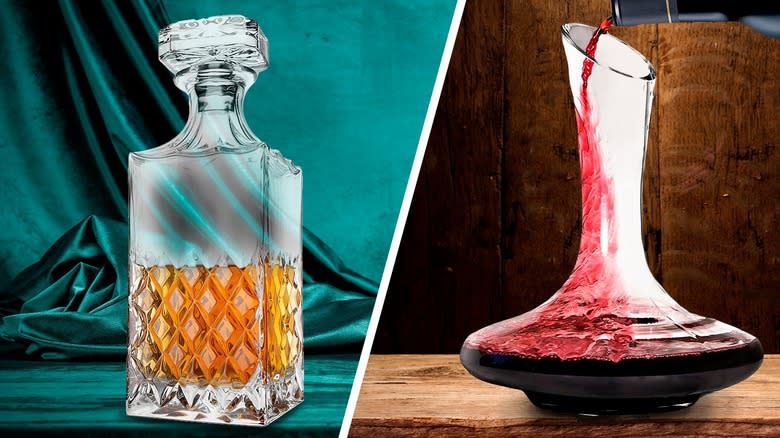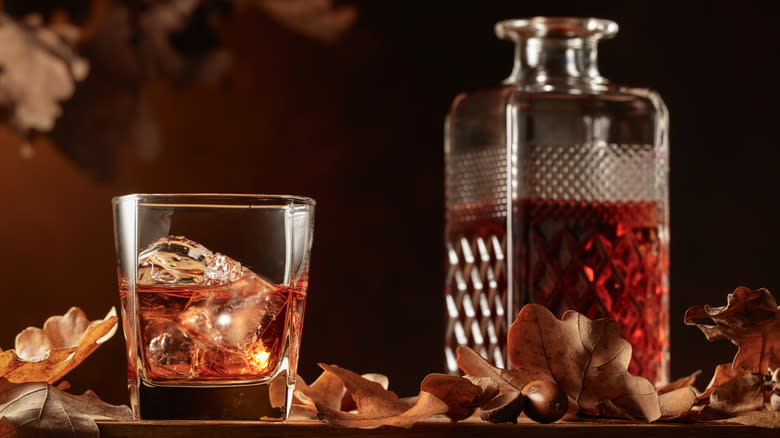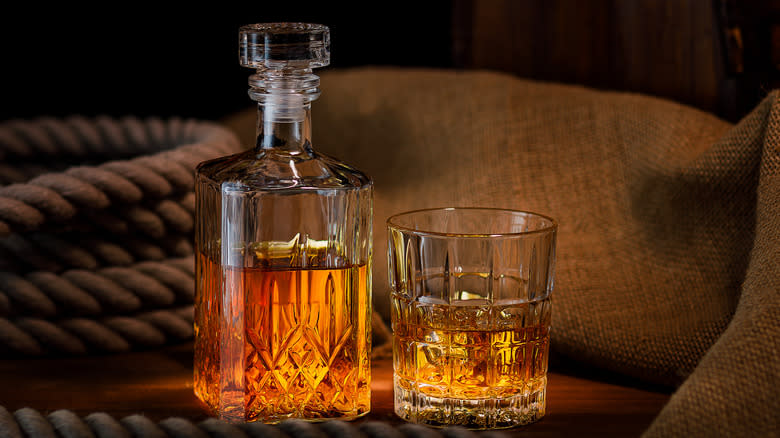Whiskey Vs. Wine Decanters: What's The Difference?

Getting serious about wine and whiskey is a fun and rewarding hobby that can stimulate both the mind and the senses. Doing so, however, may require a few key things. You will probably need plenty of educational resources, ample opportunities to taste your choice of liquors, and all of the right equipment. One of the most important pieces of equipment to have in your home bar is a decanter — or two. Wines, as well as spirits like whiskey, can be decanted, but the intention behind decanting spirits and wine is different, therefore so are the history and designs of the vessels used for each respective drink.
Are you thinking about investing in a fancy wine or whiskey decanter? Join us as we explore the origins and specific purposes of these two types of decanter. We'll also look at what makes them the right choice for the liquid they were uniquely crafted to decant.
Read more: The 25 Best Bourbon Brands, Ranked
What Is A Whiskey Decanter?

At its most basic, a whiskey decanter is a reusable container designed for holding whiskey. Early decanters, dating back to the Renaissance, were merely practical. Merchants who sold the spirit would typically travel around with whole barrels of whiskey, and usually would dispense the stuff directly from barrels into basic decanters as opposed to bottling and transporting individual containers of whiskey themselves. After that, richer households began to acquire attractive decanters, to show off their whiskey. The appeal of having a special cut-glass decanter spread like wildfire, particularly after a British glassmaker invented a version with a stopper in the 1730s.
Whiskey decanters tend to be on the heavier side and can be made of several different materials, with glass or crystal being the most traditional. However, crystal decanters may pose health risks unless you are sure that they are entirely free from lead, so most people opt to stick with glass as their material of choice. If you like the idea of a whiskey decanter, you can often find them sold with matching glassware for an even more sophisticated drinking experience.
What Is A Wine Decanter?

A wine decanter is a vessel designed to improve the quality of any given wine. These decanters came about hundreds of years ago, with examples of decanters or their predecessors being found in ancient Greek and Roman civilizations. Early versions such as this were often for simply housing the wine, rather than improving it. The more modern style evolved around 1700, when both glassmaking and wine drinking in Europe started to become big business.
Possessing a wine decanter is often seen as a sign of elegance and signals one's dedication to enjoying wine in what is perceived as the best way possible. Wine decanters are, like whiskey decanters, most often made from glass or crystal, and the concern of lead being present in crystal wares still holds here. Some modern decanters on the market may be made from aluminum or another metal, but buying these is not recommended as it can change the flavor of the wine in an undesirable way. It is worth noting that a wine decanter is not the same as a wine carafe, which has a slightly different shape and function.
Whiskey Decanters Are Mostly Decorative

With their heavy glass structure and often intricate designs, it is easy to assume that whiskey decanters serve some all-important function in the process of consuming the spirit. In reality, the decanter itself does not do much to alter the flavor or texture of whiskey at all, because whiskey does not really need to be decanted. By and large, the purpose of owning and using a whiskey decanter is just to show off your favorite drink. A nice, clear decanter will let the color and quality of your whiskey act as a decorative piece in your bar, while a more ostentatious decanter will display just how much you are willing to invest in making whiskey drinking a special experience for you. However, if you are decanting your whiskey, choose a vessel with an air-tight stopper so that air doesn't prove detrimental to the spirit over time.
Meanwhile, a wine decanter serves an important function to improve the traits found in a wine. These large, wide-based, vase-like containers are designed to aerate the wine, introducing oxygen to the beverage and allowing the smell and taste of the wine to become more noticeable. While this would happen over time without a decanter, this tool helps it to happen much more quickly, meaning you'll be able to enjoy your wine that much sooner. As an added bonus, decanters also help to separate any sediment that is present in your wine for a smoother drinking experience.
Wine Decanters Don't Have A Stopper

If you have shopped around for wine decanters before, you have probably noticed that most of them do not have a stopper to shut the top. This is because the entire point of using a wine decanter is to get air into the wine as quickly as possible. Additionally, wine cannot be stored in a decanter for an indefinite amount of time; oxidation will start working against it fairly quickly and the wine will begin to spoil. Most wine enthusiasts would decant a bottle a short while before they plan to drink it, then ensure that it's all consumed that day. For this reason, there is no practicality to creating a stopper with which to secure the wine inside the decanter.
Whiskey decanters, on the other hand, work for storing whiskey just as well as if it were sitting in the bottle you bought it in. Since it is typically enjoyed slowly over a long period of time, a stopper helps to keep unwanted dust from getting into the bottle, and prevents over-oxidisation, although this isn't as big an issue as it is with wine — as well as keeping the whiskey from getting out via an untimely spill. Plus, the addition of a stopper allows for even more ornamentation on an already ornate piece of art.
Read the original article on Tasting Table.

